By Diego Loredo
I know how stressful college can be! It can go from one week of relaxing and not having any work to having a huge amount due in such a short period of time. It can all be overwhelming, and sometimes it’s just too much to handle.
I’ve had numerous experiences of being stressed out during the time I’ve been at UNT so far. I was already stressed out early into this semester when I had to do a communications audit for a nonprofit. The nonprofit ended up not being able to work with me, and I had to find another one and do the audit in a really short period of time. Luckily, I managed to get it done in time. I’ve tried a few things to help manage my stress and here’s a few that I found to be particularly helpful.
Exercise
I usually play soccer with my friends whenever we can all get together. Whether it’s through intramurals or just getting together and kicking a ball around, it always helps clear my mind. It doesn’t have to be soccer though, it can be working out, playing other sports, or just going for a run.
Go out with friends
I know this is pretty obvious but that’s why it’s such a good method to relieve stress. Take time to go out with people that you’re comfortable with. Don’t just stay inside all the time; go out and experience new things. Whenever my friends and I go out, we usually go out of town and find new things to do. These include playing Top Golf, going to the outlets in Allen, or going to a FC Dallas game. Take some time to stop doing so much work and have fun with those close to you.
Manage your time efficiently
Don’t push everything off to the last minute. Try to get it done early or at least a few days before it’s due. Not only will you be stressing out because you procrastinated so much, but it will also affect your grades because you didn’t put as much time into it as you should have. Mark down all of your due dates on the calendar or go to the library once or twice a week to do work. Just make sure you manage when you do school work well.
I know college can be hard and I know sometimes it can be too much to handle. Honestly, it’s just one of those things that comes with going to college. There are going to be stressful days and there are going to be times when you just want to give up. I know how it feels and I’ve been close to giving up several times. Luckily I’ve encountered people who have become close to me and helped me through it all. Also I’ve learned new ways to manage my stress. I’m still learning how to manage my stress well and I hope these tips can help any college student relieve their stress.
 Diego Loredo is a junior at the University of North Texas and is majoring in public relations. He graduated from University High School in 2014. He plans on working in sports PR or for a nonprofit. He loves to play soccer and is a huge FC Dallas fan. Have something that you would like Diego to write about or have a problem that you would like to ask him? Shoot him an email at dloredo123@gmail.com.
Diego Loredo is a junior at the University of North Texas and is majoring in public relations. He graduated from University High School in 2014. He plans on working in sports PR or for a nonprofit. He loves to play soccer and is a huge FC Dallas fan. Have something that you would like Diego to write about or have a problem that you would like to ask him? Shoot him an email at dloredo123@gmail.com.
The Act Locally Waco blog publishes posts with a connection to these aspirations for Waco. If you are interested in writing for the Act Locally Waco Blog, please email ashleyt@actlocallywaco.org for more information.
By Rebecca Larsen
Eight years ago I became the first person in my family to graduate from college. I vividly remember my parents’ tears and the smiles of the two professors who helped encourage, support, and guide me to graduation and opportunities beyond. Today I work for an incredible regional campus in Waco through Texas Tech University. Texas Tech at Waco supports and connects students with opportunities in the same inspiring, specialized way that I was privileged enough to receive.
Like most of our students, I started at a community college. My courses at community college opened my eyes to the possibility of college and made me realize that I was intelligent and could excel academically given the right training. Thanks to McLennan Community College (MCC), our students begin with MCC and then transfer to Texas Tech and can finish their 4-year degree without having to leave Waco.
 In addition to Texas Tech’s comparatively inexpensive tuition, we have multiple scholarships including one students are automatically entitled to if they’re able to keep up their GPA. A four-year Texas Tech degree averages $25,000 and many of our students have their full tuition covered between scholarships and financial aid.
In addition to Texas Tech’s comparatively inexpensive tuition, we have multiple scholarships including one students are automatically entitled to if they’re able to keep up their GPA. A four-year Texas Tech degree averages $25,000 and many of our students have their full tuition covered between scholarships and financial aid.
We seek to support people who are living, loving, working, and raising families in Waco that want to benefit from higher education without going into significant debt. We offer flexible course schedules, including online and hybrid courses for those with hectic lives. The average age of our students is 29 and many are first generation college students. Whether you are looking to get a bachelor’s or even a master’s, Texas Tech has multiple degree plans that you can complete in Waco.
Even though I’m a new hire with Texas Tech, I can already see that students get the four-year university excitement at our Waco campus. Just last week, the President of Texas Tech University, Dr. Lawrence Schovanec, came to Waco to show his commitment to our campus. He spent hours speaking individually to our students at our Red Raider Rally.
Texas Tech does for Waco what the University of Texas at El Paso does for El Paso and did for me, and I’m honored to be a part of it. We are generously housed at McLennan Community College in the University Center and love when students stop by to learn more. So, come say hi!
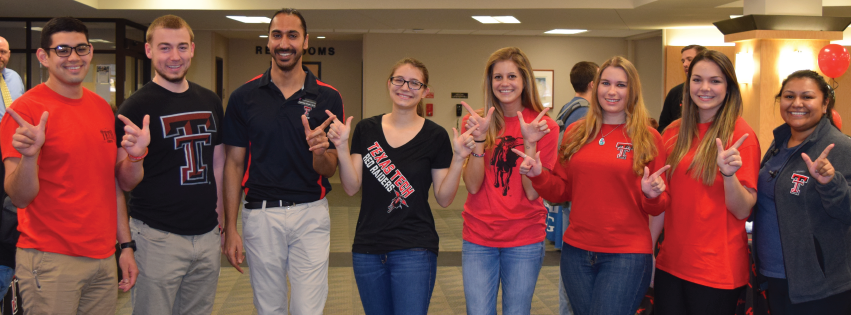
 Rebecca Larsen is the Regional Site Manager of Political Science at Texas Tech University at Waco. She loves hearing from prospective Political Science and Public Administration students. Her email is rebecca.larsen@ttu.edu. Facebook: https://www.facebook.com/TexasTechWaco Instagram: https://www.instagram.com/texastechwaco/
Rebecca Larsen is the Regional Site Manager of Political Science at Texas Tech University at Waco. She loves hearing from prospective Political Science and Public Administration students. Her email is rebecca.larsen@ttu.edu. Facebook: https://www.facebook.com/TexasTechWaco Instagram: https://www.instagram.com/texastechwaco/
By Diego Loredo
For this month’s blog, I decided to touch on something that seems to be a challenge for many students. Making a resume can be confusing and sometimes intimidating. You’re trying to showcase yourself to a future employer, and you have to make sure that your resume is both professional and shows everything that can help you land that job. I made a resume for a PR class last semester and here are a few things that I learned that could be helpful for others.
Your resume should have six main sections: Introduction, Objective, Education, Achievements/Honors, Skills/Talents, and Experience. At the top of your resume should be your contact information, such as your name, phone number, email address, and even your street address. These should be the biggest words you see on your resume. Make sure to keep the font to Arial or Calibri.
For your introduction, you should obviously introduce yourself. But, it is important to also add your major, your school, and what you plan on doing in the future. It also helps to include a sentence or two about any experience you have, but keep that part short since you will go into more detail about it later in the resume.
Your objective should be one to two sentences. It basically states what your goal is. For example, mine says “My goal is to apply what I have learned at UNT and Act Locally Waco into a sports PR career.” Keep it short and sweet.
Next, is your education. This is where you include what college you go to as well as what your major is. Make sure to include when you started attending, and, if you know it, add your anticipated graduation date. You can include your high school although it’s not a big deal if you don’t. Below your education, include your achievements/honors. This is where you show off to your employer. Include any scholarships, awards, or anything else that you think would look good on your resume.
Below that should be your skills/talents. This is the second most important section on your resume. Make sure to add skills that are relevant to the job for which you are applying. For me, since I am a PR major, I included skills like: Social media, Strategic Planning, Blogging, and Microsoft Office Word/Excel/PowerPoint. You should have at least five skills on your resume.
Finally, you add your experience. This is the most important section on your resume. This is where you add your work experience. Add any jobs that you have had, including internships. It is helpful to create a separate section where you add experience relevant to your career choice. I made a separate section called “PR Experience” where I included work that I have done during the school year for Minnie’s Food Pantry in Plano, TX. Make sure to add when you worked for each job and what you did. Include at least two bullet points of information for each job.
All of these tips that for making a resume, I learned last semester at UNT. Before that, I didn’t even know how to make a resume. You may find a better way to build your resume at your own school, if so then great. This is just to get you started. It’s always important to have a resume ready. You never know when you’ll need it!
 Diego Loredo is a sophomore at the University of North Texas. He is majoring in public relations. He graduated from University High School in 2014. Although he is still not quite sure what exactly he wants to do, he thinks he wants to work somewhere in sports PR (preferably soccer or college football). His hobbies include playing soccer and golf. He is 19 years old.
Diego Loredo is a sophomore at the University of North Texas. He is majoring in public relations. He graduated from University High School in 2014. Although he is still not quite sure what exactly he wants to do, he thinks he wants to work somewhere in sports PR (preferably soccer or college football). His hobbies include playing soccer and golf. He is 19 years old.
The Act Locally Waco blog publishes posts with a connection to these Aspirations for Waco. If you are interested in writing for the Act Locally Waco Blog, please email ashleyt@actlocallywaco.org for more information.
by Alexis Christensen
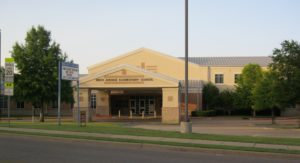 I have the privilege to work with three elementary schools within Waco ISD. They each have their unique strengths and challenges. Today though, I’m highlighting one campus in particular, West Avenue Elementary, located in the heart of North Waco on 15th Street.
I have the privilege to work with three elementary schools within Waco ISD. They each have their unique strengths and challenges. Today though, I’m highlighting one campus in particular, West Avenue Elementary, located in the heart of North Waco on 15th Street.
Waco Community Development began partnering with West Avenue in 2007. We started simply by asking people questions about their dreams and visions for their neighborhood and actively listened to their responses. Out of those conversations, our Family Engagement Program began. Today, when I ask people to describe what North Waco and West Avenue were like back then, I get responses like, “tore up” and “lots of prostitution and drug dealers” and “couldn’t see the good because of the bad.” When you looked at the neighborhood by the numbers during that time, it’s easy to see why people described their neighborhood like that. In 2009, there were 22 vacant retail/business spaces, 190 vacant residential lots, a poverty rate of 43%, and only 35% of residents were homeowners (NRS, 2009 & Census Bureau, 2000).
Yet, since the 2007-2008 school year, West Avenue has been rated by the Texas Education Agency (TEA) as Recognized, Academically Acceptable and Met Standard. And more recently, an assessment conducted by Waco ISD monitoring children’s Pre-Kindergarten readiness showed that West Avenue students were among the most ready to learn among their peers (CLI Engage Assessment). I believe it is worthwhile to take a deeper look at a few factors that helped lay the foundation for West Avenue’s success.
- In its fourteen year history, West Avenue has had 2 principals.
Andreia Foster was the first principal when the campus opened in 2002. Her “open door policy” allowed Waco Community Development and other organizations to work with students and families. Ms. Foster remained principal until 2014. Her twelve year tenure at a single campus created stability not only for families, but for the teaching staff as well.
Sheree Goodman, who taught at West Avenue for 10 years, agrees: “Low turnover [among staff] is connected to academic success, but we were more than co-workers, we became a family… a network was established. The staff was family-oriented and all stakeholders were included in every process. We always tried to do what was best for the kids; we truly believed in the students,” she said.
This legacy lives on through West Avenue’s “new” principal, Joseph Alexander, who just finished his second school year. Mr. Alexander’s motto is “No child is left behind at West Avenue.” This is demonstrated through his vigor and big dreams for his campus. He stated, “I want West Avenue to be a Blue Ribbon campus, a model for the State of Texas. Our students are the best in the state. We will do what other people say we can’t do with children from poverty. We believe that children can learn and will learn if given opportunity to be successful.”
These beliefs and core values both inspire and motivate students and teachers to be the best.
- Residents and community organizations are committed for the long haul.
 North Waco residents are not shy about their love for their neighborhood. An abundance of committed and trusted organizations and people live, work, worship and play in the neighborhood on a consistent basis. I would be remiss to try and name them all here; however, I’ve observed two main characteristics which distinguish these groups from others: their sustained commitment to learning from varying experiences and perspectives, and their deep held belief that trust is not a right due to them because of good intentions, but trust is a privilege to be earned. These practices are not cultivated overnight but develop with time.
North Waco residents are not shy about their love for their neighborhood. An abundance of committed and trusted organizations and people live, work, worship and play in the neighborhood on a consistent basis. I would be remiss to try and name them all here; however, I’ve observed two main characteristics which distinguish these groups from others: their sustained commitment to learning from varying experiences and perspectives, and their deep held belief that trust is not a right due to them because of good intentions, but trust is a privilege to be earned. These practices are not cultivated overnight but develop with time.
- Homeownership is growing in North Waco.
 Homeownership is a major factor in creating neighborhood stability. A growing body of research points out that homeownership has the potential to positively impact educational goals.
Homeownership is a major factor in creating neighborhood stability. A growing body of research points out that homeownership has the potential to positively impact educational goals.
“Affordable and sustainable forms of homeownership can also help families achieve long-term stability. Research on the connection between homeownership and children’s education has found that homeowners tend to move less frequently than renters and that this may account for part of the difference in educational outcomes between children of homeowners and children of renters” (Holupka, C. Scott and Sandra J. Newman. 2010).
Waco Community Development was created with the lofty and ever galvanizing mission to inspire and cultivate healthy neighborhoods. In 2001, we joined the ranks of housing entities like Waco Habitat for Humanity and NeighborWorks who strived to create a culture of homeownership. For us, working within a geographically defined area proved to be a successful model. Today, the homeownership rate in Census Tract 12 (North Waco area) is 42%, an increase of approximately 7 percentage points from the 2009 sample data (Census 2014). We have seen vested homeowners become PTA officers, volunteers and mentors for students at West Avenue. One such Waco Community Development homeowner not only became the PTA Treasurer, but her son was valedictorian of his 5th grade class last May.
The complexity of factors influencing neighborhood development can make it difficult to understand what particular cause created a particular effect. There are schools of thought that believe this to be a negative thing, but I see a positive in the midst of the murkiness: It allows people and organizations to be interdependent when tackling difficult issues within our communities. It doesn’t excuse us from critically evaluating our work or from pursuing excellence; it simply means we have the opportunity to reach out to partners all around us to create even greater positive impact.
West Avenue has learned to lean on and be leaned upon and I think that’s a piece of why it’s experiencing such great success. Former teacher Ms. Goodman said it best, “The school is still a pillar. People know they can go there for anything they need and the partners have become resources for both the community and the school.”
 Alexis Christensen is a Community Organizer at Waco Community Development Corporation (Waco CDC) where she focuses on community building, leadership development and building collaborations.
Alexis Christensen is a Community Organizer at Waco Community Development Corporation (Waco CDC) where she focuses on community building, leadership development and building collaborations.
The Act Locally Waco blog publishes posts with a connection to these aspirations for Waco. If you are interested in writing for the Act Locally Waco Blog, please email ashleyt@actlocallywaco.org for more information.
By Fred Hills
Inquiry. Research. The ability to come up with questions and actively, rigorously pursue answers to those questions is at the heart of education. It is the key to life-long learning, to new inventions, to solving problems, and to improving the way we live and work together in our community and in our world. Just as important as being able to find answers is the ability to communicate findings clearly so that they can be of use to the wider world. At McLennan Community College, students practice inquiry and research throughout the academic year. We would like to invite you to hear about some of their findings and to see for yourself how well they communicate what they have learned in their explorations.
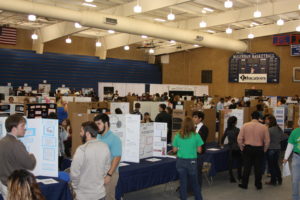 Every fall and spring semester McLennan Community College conducts an event to showcase student research projects. The event, called Scholar Day, is an opportunity for students from across campus to share the results of their inquiry and the impact it has on our community. Participating students come from a wide variety of disciplines including Biology, Chemistry, Engineering, Management, Marketing, Music, and Respiratory Care, among others.
Every fall and spring semester McLennan Community College conducts an event to showcase student research projects. The event, called Scholar Day, is an opportunity for students from across campus to share the results of their inquiry and the impact it has on our community. Participating students come from a wide variety of disciplines including Biology, Chemistry, Engineering, Management, Marketing, Music, and Respiratory Care, among others.
Research projects at MCC are student initiated with faculty helping guide them through their exploratory work. Students then present findings through scholarly presentations, exhibits, poster boards, art work, music, and prototypes with the campus and the community. Research not only prepares the student for their chosen career path, but will help them if they choose to further their education beyond MCC.
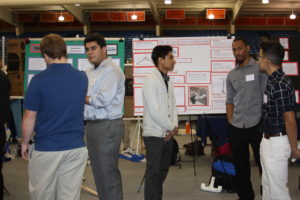 This semester’s program includes over 20 presentations that address timely topics affecting our world today, for example undocumented students in higher education, using vitamin C to fight cancer, and the effects of violent video games on gamers. Several presentations tackle medical topics, like adult respiratory distress syndrome, interstitial lung disease, and LSVT BIG and VOICE therapy on Parkinson’s disease. Scholar Day will also include a few unique items, such as sculptures, painting, and pottery from the Fine Arts department, and inventions and “Rube Goldberg” machines from the Engineering department. Last fall saw over 300 students participate, a number that continues to climb each semester.
This semester’s program includes over 20 presentations that address timely topics affecting our world today, for example undocumented students in higher education, using vitamin C to fight cancer, and the effects of violent video games on gamers. Several presentations tackle medical topics, like adult respiratory distress syndrome, interstitial lung disease, and LSVT BIG and VOICE therapy on Parkinson’s disease. Scholar Day will also include a few unique items, such as sculptures, painting, and pottery from the Fine Arts department, and inventions and “Rube Goldberg” machines from the Engineering department. Last fall saw over 300 students participate, a number that continues to climb each semester.
Come join our students in the excitement of academic inquiry and exploration! If you would like to attend MCC’s Scholar Day, it will be at Highland Gym on Friday, April 22 from 10 to 1 PM. All students and community members are invited to join us. If you need any more information, please contact Dr. Staci Taylor at staylor@mclennan.edu.
 Dr. Fred Hills is the current president of the HOT P-20 and Dean of Arts, Science and Business at McLennan Community College. He has worked and lived in the Waco community for over 20 years and has served on the HOT P20 for the last four years.
Dr. Fred Hills is the current president of the HOT P-20 and Dean of Arts, Science and Business at McLennan Community College. He has worked and lived in the Waco community for over 20 years and has served on the HOT P20 for the last four years.
The Act Locally Waco blog publishes posts with a connection to these aspirations for Waco. If you are interested in writing for the Act Locally Waco Blog, please email ashleyt@actlocallywaco.org for more information.
by Fred Hills
Few things are more important to the prosperity of our community than our educational systems. As citizens, it is our responsibility to keep up to date on the state of those systems, but that is sometimes difficult to do. Where can you get objective information about how well the schools systems are performing? How can a “lay” person get in depth information about some of the important decisions being made that have the potential to affect our children and our economic prospects? How can we get that information we need to be informed, responsible parents, teachers and community members when it comes to education? Fortunately, an opportunity is on the horizon to help us do just that.
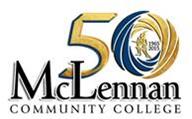 The Heart of Texas P-20 Council & Prosper Waco are cohosting this year’s State of Education in the Heart of Texas on Tuesday, April 19 from 11 AM to 1:30 PM at the McLennan Community College Conference Center. The community is invited.
The Heart of Texas P-20 Council & Prosper Waco are cohosting this year’s State of Education in the Heart of Texas on Tuesday, April 19 from 11 AM to 1:30 PM at the McLennan Community College Conference Center. The community is invited.
The forum will provide statistics and information on the progress of local educational efforts followed by panel discussions giving students, industry partners and educational leaders the opportunity to share their perspectives on education in central Texas. Prosper Waco will also share their ongoing efforts in bringing together collaborating partners from the greater Waco area in cooperatively addressing educational issues in our community.
We are honored to have Texas’s House Representative Jimmie Don Aycock as our lunch keynote speaker. Rep Aycock represents District 54 and currently serves as the chair of the Public Education Committee and a member of the Defense & Veterans’ Affairs Committee. He will share his perspectives on educational policy in Texas.
The agenda is as follows:
- 11:00-11:10 a.m.: Introduction by Fred Hills, Heart of Texas P-20 Council and Matthew Polk, Executive Director of Prosper Waco
- 11:10-11:30 a.m.: Presentation: Statistics of Education in the Heart of Texas
- 11:30-11:50 a.m.: Industry Panel Discussion
- 11:50-12:10 p.m.: Student Panel Discussion
- 12:10-1:00 p.m.: Lunch & Keynote Speaker, Rep. Jimmie Don Aycock
- 1:00-1:30 p.m.: Updates from the Heart of Texas P-20 Council and Prosper Waco
Registration cost is $15 which includes lunch. All are invited and welcome to register at Region 12 ESC’s website txr12.escworks.net/catalog/search.aspx, Session #88565. If you have any questions about the forum, contact either Fred Hills at fhills@mclennan.edu or Chris Holecek at cholecek@esc12.net.
 Dr. Fred Hills is the current president of the HOT P-20 and Dean of Arts, Science and Business at McLennan Community College. He has worked and lived in the Waco community for over 20 years and has served on the HOT P20 for the last four years.
Dr. Fred Hills is the current president of the HOT P-20 and Dean of Arts, Science and Business at McLennan Community College. He has worked and lived in the Waco community for over 20 years and has served on the HOT P20 for the last four years.
by Diego Loredo
Trying to decide what college to go is intimidating. While I was at A.J. Moore Academy, and later University High School, I never really thought about college and what I wanted to do with my life. It wasn’t until senior year that I actually started thinking about it.
Senior year was hectic, and it was hard for me to figure out what I wanted to do. My mind was filled with all kinds of things: paying senior dues, filling out scholarships, applying to colleges, and other things outside of school. I eventually decided that I wanted to major in journalism and be a news reporter. I’ve always kept up with the news and I loved to write so I figured it would be a good choice for me.
After I figured out my major, I ended up applying to three colleges: Texas State University, University of Texas at Arlington, and University of North Texas. UTA was originally my first choice and I was planning on visiting the campus, but then I found out about UNT Preview, which was scheduled for November. UNT Preview is an event that invites high school seniors to take a campus tour and explore the different facilities available at UNT. So I ended up going with my mom to take a campus tour. It was cold, but I fell in love with the campus and upon leaving I knew that UNT was the college for me.
For the rest of senior year, I was just preparing myself for freshman year. I filled out my FAFSA, I won the Brazos Education Foundation Scholarship, completed my dual credit courses, etc. Before I knew it, I graduated from UHS and was already starting my freshmen year at UNT. I ended up being roommates with a good friend of mine. That made it easier to get used to the fact that I was in college!
Freshman year flew by. I took mostly basics and journalism classes. I learned so many things about myself as freshman year went by. I made new friends, experienced new things, and have matured more. I ended up switching from news writing to public relations because I found out that news writing wasn’t really for me, despite being so excited for it in high school. Public relations is a lot more interesting to me, and to be honest I did it for the money.
Now I’m a sophomore living in an apartment with three other high school friends. I’ve taken numerous PR classes, I’m working with a nonprofit, and have been building up my resume to prepare me for after college. There’s only three more months before sophomore year ends, even though technically I’m a junior based on my credits. During the summer I plan on doing an internship, though I’m not sure where yet. My plan is to do an internship with FC Dallas, an MLS team that is offering summer internships for college students, but if that doesn’t work out then I will probably do an internship with a nonprofit in Denton or Waco.
Although it’s been an extremely bumpy road, I’m glad I chose UNT and I highly recommend it for anyone who wants to go to college. It’s great for journalism and PR students as well as for engineering and music. I’m continuing to learn new things as each new day passes by and I’m just trying to enjoy every little bit before I start my career in public relations.
 Diego Loredo is a sophomore at the University of North Texas. He is majoring in public relations. He graduated from University High School in 2014. Although he is still not quite sure what exactly he wants to do, he thinks he wants to work somewhere in sports PR (preferably soccer or college football). His hobbies include playing soccer and golf. He is 19 years old.
Diego Loredo is a sophomore at the University of North Texas. He is majoring in public relations. He graduated from University High School in 2014. Although he is still not quite sure what exactly he wants to do, he thinks he wants to work somewhere in sports PR (preferably soccer or college football). His hobbies include playing soccer and golf. He is 19 years old.
The Act Locally Waco blog publishes posts with a connection to these Aspirations for Waco. If you are interested in writing for the Act Locally Waco Blog, please email ashleyt@actlocallywaco.org for more information.
(The Heart of Texas P-20 Council includes representatives from K-12 education, higher education and employers. They meet regularly to help coordinate efforts to launch our young people into productive lives as workers and citizens. This post is one in a monthly series of posts intended to share information about the work of this important group in our community. For more posts in this series, click here: P-20 education.)
by Christine Holecek
What is Labor Market Information (LMI)? Some people believe the LMI is largely made-up information. But it is actually information that is pulled from premier data sites. National data is found at the bureau of labor and statistics http://www.bls.gov. State data is found through the Texas Workforce Commission, Tracer 2 website http://www.tracer2.com. Labor Market Information is broken down in codes. The industry codes are called NAICS, Occupational Codes are called SOC, and Training Codes are referred to as CIP.
NAICS, the North American Industry Classification System, is the standard used by Federal agencies in classifying businesses for collecting, analyzing, and publishing statistical data related to the U.S. business economy. SOC, Standard Occupation Classification – used by Federal agencies to classify workers into occupational categories for collecting, calculating, disseminating data. Workers are classified into one of over 820 occupations. Occupations are combined to form 23 major groups, 96 minor groups, and 449 broad occupations. Each broad occupation includes detailed occupation(s) requiring similar job duties, skills, education, or experience. CIP, Classification of Instructional Programs – used by the National Center for Education Statistics to collect, collate, analyze, and report full and complete statistics on the condition of education. The CIP functions as a taxonomic scheme to support the tracking, assessment, and reporting of fields of study and program completion activity.
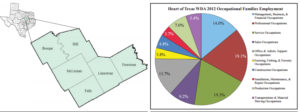 What does the demand for talent look like in the HOT Workforce Area? Waco is considered the Metropolitan Statistical Area for Heart of Texas (HOT) Workforce Solutions. LMCI analysts and users are particularly interested in K-12 educational programming because it is a pipeline to future employees. A list of targeted occupations can be found at http://www.yestoyouth.com/careers.html. Careers from Aviation to Welding can be found on the targeted occupation list. In demand career clusters include: Transportation, Manufacturing, Health Care, Business, Information Technology, Law and Public Safety. Below is the occupational projections from the Heart of Texas which can be found at http://www.tracer2.com/admin/uploadedPublications/2031_13_HeartOfTexas_2012-2022.pdf
What does the demand for talent look like in the HOT Workforce Area? Waco is considered the Metropolitan Statistical Area for Heart of Texas (HOT) Workforce Solutions. LMCI analysts and users are particularly interested in K-12 educational programming because it is a pipeline to future employees. A list of targeted occupations can be found at http://www.yestoyouth.com/careers.html. Careers from Aviation to Welding can be found on the targeted occupation list. In demand career clusters include: Transportation, Manufacturing, Health Care, Business, Information Technology, Law and Public Safety. Below is the occupational projections from the Heart of Texas which can be found at http://www.tracer2.com/admin/uploadedPublications/2031_13_HeartOfTexas_2012-2022.pdf
How does LMI meet the need of CTE Students? LMI Matters! It aims to help develop awareness of labor market information (LMI) and to show how it can be used effectively. It is for anyone who is helping adults or young people to explore opportunities for work or further learning. Our K-12 school system is training a future workforce that helps with the recruitment and retention of employers in our region. The HOT P-20 system includes pre-K through career as the pipeline of students that move on to post-secondary after high school graduation. The Greater Waco Chamber of Commerce has identified a talent pool of future employees and encourages training the following targeted industries: Advanced Manufacturing, Aerospace and Defense, Supply Chain Management, Health Care, Professional and Financial Services. Independent School Districts need to focus on the Labor Market Information and the targeted industries to ensure that we prepare our students today for jobs needed by tomorrow’s employers.
 This Act Locally Waco blog post was written by Christine Holecek. Christine is an Education Specialist at Education Service Center Region 12 in Waco. She has worked in the area of Adult Education and Career & Technical Education for the past 25 years. She earned an AAS degree from MCC, a BAAS and Master’s Degree from the University of North Texas and is currently enrolled in the Doctoral Program in Educational Leadership and Policy Studies at Tarleton State University.
This Act Locally Waco blog post was written by Christine Holecek. Christine is an Education Specialist at Education Service Center Region 12 in Waco. She has worked in the area of Adult Education and Career & Technical Education for the past 25 years. She earned an AAS degree from MCC, a BAAS and Master’s Degree from the University of North Texas and is currently enrolled in the Doctoral Program in Educational Leadership and Policy Studies at Tarleton State University.
The Act Locally Waco blog publishes posts with a connection to these aspirations for Waco. If you are interested in writing for the Act Locally Waco Blog, please email ashleyt@actlocallywaco.org for more information.
By Diego Loredo
It’s a new year and for college students a new semester! That means it’s time for relentless classes, long nights of studying, and who knows what else. For me, this is my fourth semester at UNT and I’m preparing myself for another long semester.
My spring semester is looking pretty good so far. I’m taking four classes for my major, public relations, and one foreign language class (Japanese). All of my classes are after 10 so that means I don’t have to wake up too early since I don’t have any 8 am classes anymore. Also, on Thursdays and Fridays I only have one class so that makes it easier for me. I only see myself having a problem in maybe two classes; this semester should be a good opportunity to get my GPA back up.
Now it’s time to get down to business. Going into my fourth semester, I’m getting more and more accustomed to college. Because of that, I’ve developed a few ways on how to start the semester off right. Everyone has their own way of beginning the semester but hopefully these will be helpful to any college student.
Buy a calendar!
Buying a calendar for school has become a habit of mine. You can buy a regular calendar or, like me, buy a dry-erase calendar so you can easily write/erase things. Having a calendar can help you keep track of things and make sure you don’t fall behind in any of your classes. What I do is write everything that I have to do that month so that I know exactly what is due and what I still have to time to do. A calendar is an irreplaceable, and cheap, college investment.
Introduce yourself to your classmates
I’ve said this before and I’m going to say it again. Introduce yourself to your classmates! At the end of each class, introduce yourself to a few classmates so that you have someone to go to in case you’re having trouble in that class. Or maybe you’ll be lucky enough to have a class with some friends. Having someone you can go to for help in a class will be your most valuable asset.
Dedicate a few hours a day to studying
This is hard for me to do, but it’s something I’m trying to get myself to do more. It doesn’t have to take up half your day, but dedicate maybe two or three hours a day to studying. It can even be just an hour, as long as you’re using a part of your day to get ahead in one of your classes. Another thing I do is dedicate a day during the weekend to study and catch up on my classes, then spend the night hanging out with friends. I’m not saying study every day after class, but make a schedule of when you’ll study for each class to make sure you get things done.
I know college can be stressful and not fun at all sometimes. But all it takes to make college enjoyable is to have a plan ready. Once you make that plan and stick to it, it can completely turn around your semester. If you stick to these three things, then I’m sure it’ll make your semester much easier. I’m looking forward to what this semester has in store for me and will do everything I can to make it as enjoyable as possible.
 Diego Loredo is a sophomore at the University of North Texas. He is majoring in public relations. He graduated from University High School in 2014. Although he is still not quite sure what exactly he wants to do, he thinks he wants to work somewhere in sports PR (preferably soccer or college football). His hobbies include playing soccer and golf. He is 19 years old.
Diego Loredo is a sophomore at the University of North Texas. He is majoring in public relations. He graduated from University High School in 2014. Although he is still not quite sure what exactly he wants to do, he thinks he wants to work somewhere in sports PR (preferably soccer or college football). His hobbies include playing soccer and golf. He is 19 years old.
The Act Locally Waco blog publishes posts with a connection to these Aspirations for Waco. If you are interested in writing for the Act Locally Waco Blog, please email ashleyt@actlocallywaco.org for more information.
By Christine Holecek
Groundhog Job Shadow Day is a unique initiative dedicated to giving kids job  shadowing experiences. Groundhog Job Shadow kick-off day for 2016 will be February 2. On that day we will officially get going started on what we hope will be a spring blooming with job-shadowing opportunities in the Heart of Texas. The idea is to give more of our Waco area students opportunities to “shadow” a workplace mentor as he or she goes through a normal day on the job. This gives the student a chance to get an up-close look at how skills learned in school relate to the workplace.
shadowing experiences. Groundhog Job Shadow kick-off day for 2016 will be February 2. On that day we will officially get going started on what we hope will be a spring blooming with job-shadowing opportunities in the Heart of Texas. The idea is to give more of our Waco area students opportunities to “shadow” a workplace mentor as he or she goes through a normal day on the job. This gives the student a chance to get an up-close look at how skills learned in school relate to the workplace.
 Groundhog Job Shadow Day is the joint effort of the Heart of Texas P-20 Council, Greater Waco Chamber of Commerce, Waco Business League, and Prosper Waco. McLennan Community College, Texas State Technical College and school districts in the Heart of Texas Region are also partners promoting this event.
Groundhog Job Shadow Day is the joint effort of the Heart of Texas P-20 Council, Greater Waco Chamber of Commerce, Waco Business League, and Prosper Waco. McLennan Community College, Texas State Technical College and school districts in the Heart of Texas Region are also partners promoting this event.
Job Shadowing is a Win-Win situation for all involved. For students it answers the age old question “Why do I have to learn this?” Shadowing demonstrates the importance of academics in reaching college and career goals. Shadowing also motivates students to learn by demonstrating the tangible application of classroom lessons.
For employers, Job Shadowing helps build a future workforce. Shadowing shows students career possibilities in different industries. Also the employee mentors get the feeling of personal satisfaction that comes from mentoring a young person. This opportunity offers a chance to share knowledge and skills and to help a child become a successful adult. Sometimes shadowing even leads to a long-term mentoring relationship.
Whether you are an employer, volunteer or teacher, participating in Groundhog Job Shadow Day is an easy and rewarding experience. Getting involved in Groundhog Job Shadow Day will only take a few hours of your time.
If you are an educator or an employer who would like to get involved, you can contact Christine Holecek at cholecek@esc12.net. The HOT P-20 has posted some helpful job shadowing documents for you to share at: http://tinyurl.com/zynwu2r
For more information about the HOT P-20 Groundhog Job Shadow Day, please contact cholecek@esc12.net
 This Act Locally Waco blog post was written by Christine Holecek. Christine is an Education Specialist at Education Service Center Region 12 in Waco. She has worked in the area of Adult Education and Career & Technical Education for the past 25 years. She earned an AAS degree from MCC, a BAAS and Master’s Degree from the University of North Texas and is currently enrolled in the Doctoral Program in Educational Leadership and Policy Studies at Tarleton State University.
This Act Locally Waco blog post was written by Christine Holecek. Christine is an Education Specialist at Education Service Center Region 12 in Waco. She has worked in the area of Adult Education and Career & Technical Education for the past 25 years. She earned an AAS degree from MCC, a BAAS and Master’s Degree from the University of North Texas and is currently enrolled in the Doctoral Program in Educational Leadership and Policy Studies at Tarleton State University.
The Act Locally Waco blog publishes posts with a connection to these aspirations for Waco. If you are interested in writing for the Act Locally Waco Blog, please email ashleyt@actlocallywaco.org for more information.

